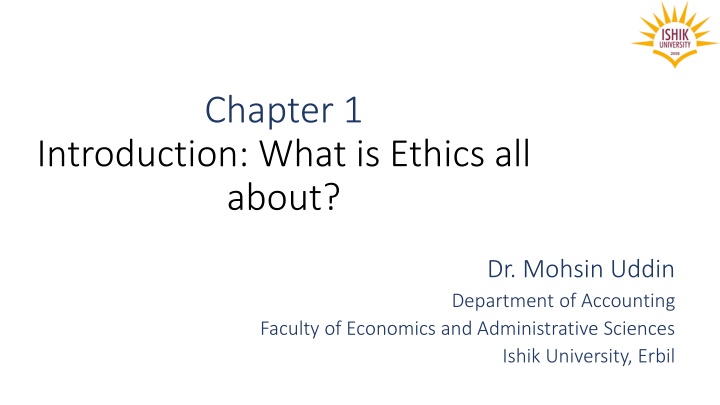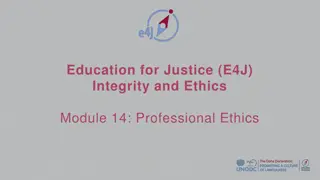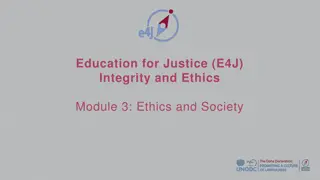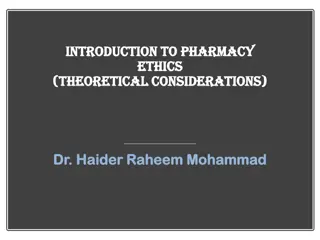Relationship Between Ethics and Law
Ethics, derived from Greek ethos and Latin mores, focuses on rightfulness and wrongfulness in human actions for ultimate happiness. It pertains to good or bad behavior, values, honesty, and moral principles. Ethics pertains to voluntary actions, deals with human conduct, and serves as guiding standards influencing decisions. Some key examples of ethics include truthfulness, honesty, loyalty, respect, fairness, and integrity. Ethics, as guiding principles, help individuals and groups discern between right and wrong, governed by individual or legal/professional norms, while being generally consistent and applicable in various contexts. The relationship between ethics and law involves intersections of ethical legal behaviors, legal unethical actions, and areas where legality and ethics align or conflict.
Uploaded on Nov 24, 2024 | 2 Views
Download Presentation

Please find below an Image/Link to download the presentation.
The content on the website is provided AS IS for your information and personal use only. It may not be sold, licensed, or shared on other websites without obtaining consent from the author.If you encounter any issues during the download, it is possible that the publisher has removed the file from their server.
You are allowed to download the files provided on this website for personal or commercial use, subject to the condition that they are used lawfully. All files are the property of their respective owners.
The content on the website is provided AS IS for your information and personal use only. It may not be sold, licensed, or shared on other websites without obtaining consent from the author.
E N D
Presentation Transcript
Chapter 1 Introduction: What is Ethics all about? Dr. Mohsin Uddin Department of Accounting Faculty of Economics and Administrative Sciences Ishik University, Erbil
Ethics Etymologically the term ethics correspond to the Greek word ethos which means character, habit, customs, ways of behaviour, etc. Ethics is also called moral philosophy . The word moral comes from Latin word mores which signifies customs, character, behaviour, etc. Ethics may be defined as the systematic study of human actions from the point of view of their rightfulness or wrongfulness, as means for the attainment of the ultimate happiness.
Ethics Ethics is the attitude of being good or bad in behavior, action and taking the decision in different situations. It deals with the moral values. It helps to individual or an organization for honesty.
SCOPE OF ETHICS SCOPE OF ETHICS Ethics deals with voluntary actions. We can distinguish between human actions and actions of human. Human actions are those actions that are done by human consciously, purposely and in view of an end. Actions of human may not be willfully, voluntarily, consciously and deliberately done but all the same they are done by human (e.g. sleeping, walking, etc.). It is the intention which makes the difference between human action and action of human. In ethics we deal only with human actions.
Cont. Ethics is a branch of philosophy that deals with the principles of conduct of an individual or group. It works as a guiding principle as to decide what is good or bad. They are the standards which govern the life of a person. Ethics is also known as moral philosophy.
Some examples of Ethics are Some examples of Ethics are : : Truthfulness Honesty Loyalty Respect Fairness Integrity
Ethics are the guiding principles which help the individual or group to decide what is good or bad. Governed By Individual or Legal and Professional norms Applicability in Business Yes/No Consistency Ethics are generally uniform
How are ethics and law related? Ethical Legal & Ethical Illegal & Ethical Illegal Legal Legal & Unethical Illegal & Unethical Unethical
WHAT ARE ETHICS? Ethics tell us about our moral duties and obligations so that our behaviour at work or at home is right, truthful. Ethics are a set of standards and rules that are required by an individual for leading a satisfactory family life and being a good worker. Therefore, you require a set of ethics at home as well as at your work place.
You can observe the ethical behaviour through the following habits. sincerity honesty truthfulness respect for self and others respect for time respect for work respect for our environment
Besides these ethics in our domestic life, our work place demands certain specific ethics. These are: regularity and punctuality confidentiality loyalty maintaining friendly relations with colleagues and clients willingness to learn and take on new responsibilities
Ethics in our domestic life Respect for self, others and elders Respect for time Respectful relations with young and old Willingness to learn and take new responsibilities Ability to judge the right and wrong and make right decision at given time.
NEED FOR ETHICS Now let us find out why it is essential to have good ethics and how they affect our interpersonal relationship and work performance. Any work situation either at the office or at home has three major components: Work, Worker and the Work Place. The Work is the actual task to be done. The Worker is the person who does the task. Work Place includes the place for doing the task, tools and equipment's required and the storage space for them.
Summing up Ethics is the theory of right and wrong conduct. Right and Wrong: Ethics is defined as the science of wrongfulness of conduct. What makes an action right or wrong? The word right derives from the Latin rectus , meaning straight or according to norm . rightfulness or























